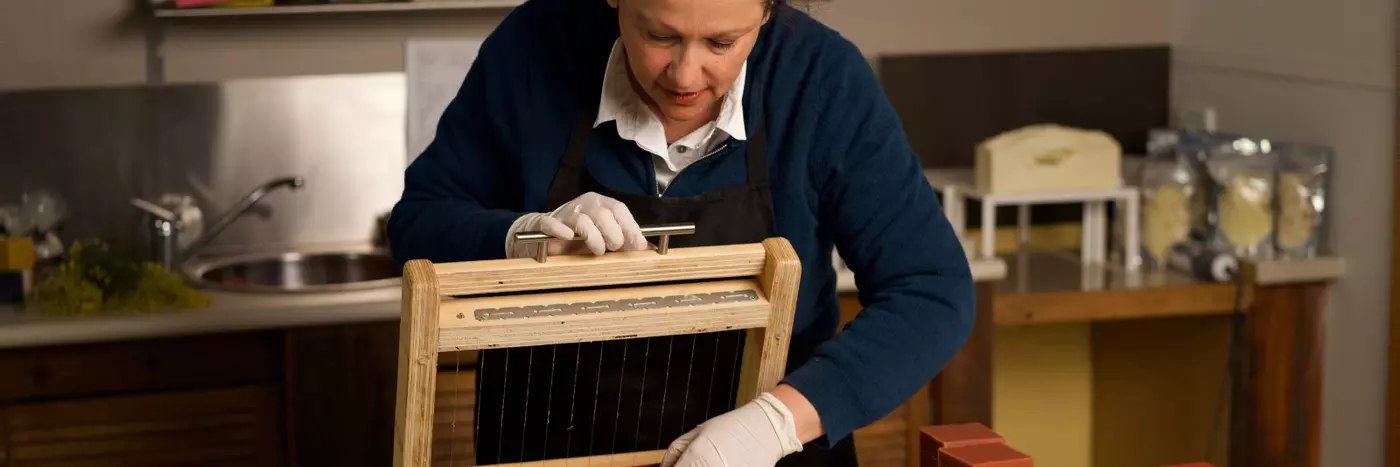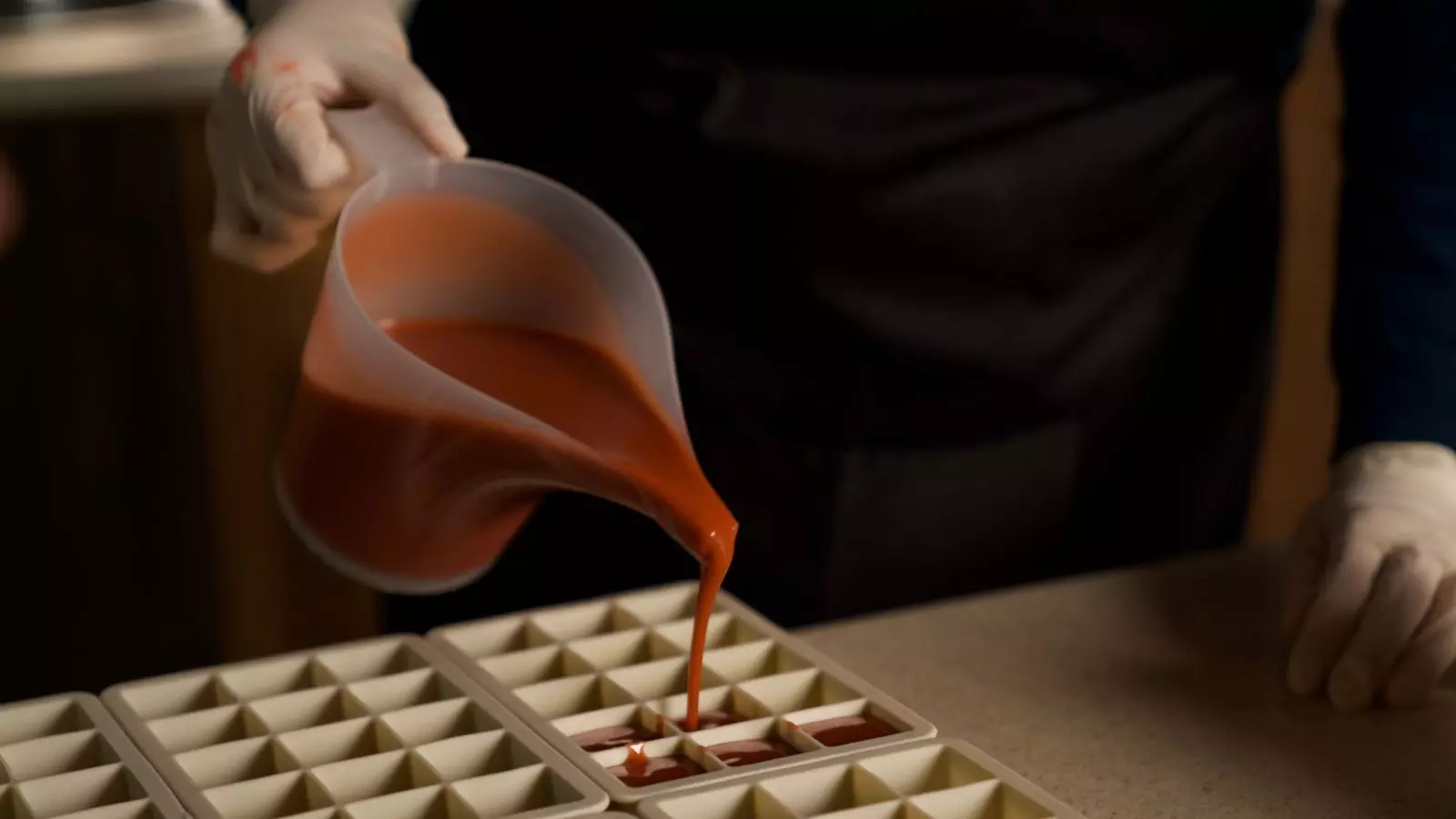UncoveredMwerre Soap & Skin
The Opera House showcases artistic talent on stages of all sizes. With a year-round catalogue of extraordinary events and performances, its iconic sails are home to inspiration and creativity in all forms.
With its Uncovered program, the Sydney Opera House Shop celebrates artistic excellence on a new stage. Liz Liddle is the founder of Mwerre - Soap and Skin, a First Nations female-owned small business that manufactures artisan soaps based in Creswick, Victoria. Meaning ‘good’ or ‘beautiful’ in Arrernte, a First Nations language group in Central Australia, Mwerre (pronounced Mwah-rah) uses native ingredients to produce handmade soaps with Indigenous clay minerals and botanicals that protect and care for the skin.
Liz shared how and why she started Mwerre and how her practices stem from traditional soap-making methods.
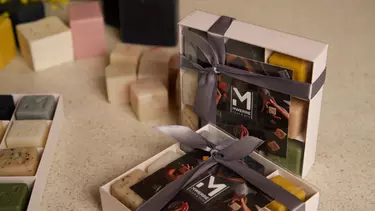
Tell us about your brand and yourself
My name is Liz Liddle, and I’m an Arrernte woman living in Victoria. Originally Mwerre started as a handmade artisan soap business but at some point, the plan is to eventually become a holistic wellness brand with additional skincare and spa products. With Mwerre, I incorporate Indigenous Australian ingredients into the products by using Indigenous clays and native botanicals. I focus on natural ingredients that represent Australia and infuse them in the products.
How did you learn to create soaps?
I taught myself through a lot of desktop research but I also learnt so much through experimentation. Before I even started the business, it took me a year to learn, do product testing and do all the product development. I made lots of mistakes before I was ready to launch that first line of products, and even still I was tweaking them along the way and learning how to make the products better and more effective.
I primarily use a method called ‘cold process’ soap making, which is a traditional method that’s tens of thousands of years old - I think it was used in ancient times by the Ancient Egyptians and Babylonians. The technique is based on the fundamental ingredients of ‘ash’ and fats, but now we have more modern ingredients. The ancient Egyptians and other ancient cultures used to make soap from ash and mix it with animal fats and oils. It’s a very ancient process, but today the method of saponification (making soap) is more efficient and cleaner. You can also make soap using other methods like hot processing, but I mainly cold process the Mwerre soaps which is generally different to commercially manufactured soap you might find in a supermarket – these are more like a solid detergent than actual soap. Using the cold process method makes our soaps gentler than commercial soaps.
In Arrernte, Mwerre means ‘good’ or ‘beautiful’...it described what I wanted to achieve... making good quality soap products that promote beautiful skin.
What does Mwerre mean and what is the inspiration behind it?
In Arrernte, Mwerre means ‘good’ or ‘beautiful’. It’s a fairly common word, and I used it to represent my business because it described what I wanted to achieve in terms of making good quality soap products that promote beautiful skin.
How do you choose the ingredients for your products?
Initially I focused on using clays, and that’s what I’ve used in my Sydney Opera House collection. I used to work in the spa industry and during that time, I became interested in pelotherapy, which is the name for clay therapy. Clay is a natural healing mineral; traditionally, people even ingest it for healing. A good example is the modern use of mud masks.
Different clays have different properties depending on their mineral makeup. For example, if you had acne breakouts, you could mix green clay with water to draw out impurities and oils in the skin. Clay is what we call an adsorber and an absorber. When you mix something like essential oils with clay, the clay absorbs the oils in between its molecules. So when you put it on your skin, the clay and what’s between the molecules go into the skin, but it simultaneously adsorbs, collecting impurities on its surface, which is why I like to use it. It imparts certain properties to the skin and simultaneously draws out impurities. It’s a pretty special ingredient.
Why is it important for you to use natural ingredients?
It’s not always easy to choose natural ingredients, but I try my best. For me, they equate to high quality, which is why you might pay more for natural and organic ingredients. I don’t want to do more harm than good to the environment, so sourcing natural ingredients is an important and ongoing process for me. The good thing about Australia is that most ingredients are quite highly regulated, so they’re of a high standard.
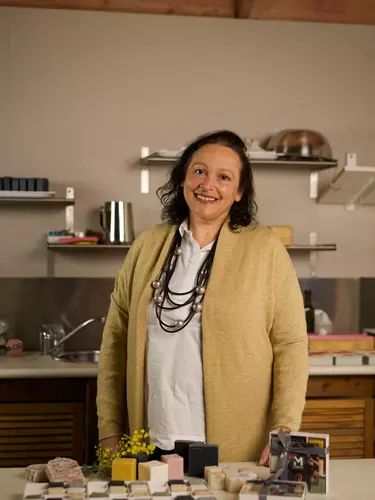
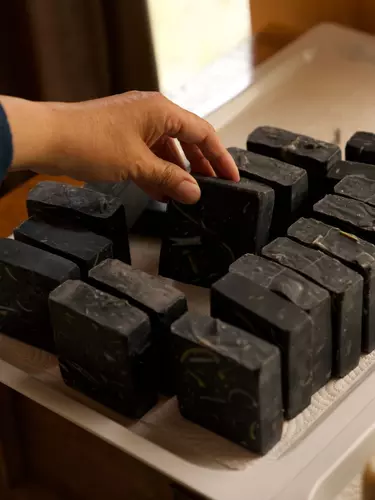
I don’t want to do more harm than good to the environment, so sourcing natural ingredients is an important and ongoing process for me.
What is involved in the production process of making your soaps/products?
Our soaps are made by hand and I source all of our ingredients myself. If I want to make a specific type of soap from scratch, I design a recipe. I measure and weigh out all the ingredients, with some having to be melted before they go into the soap. Then I measure out the clays and essential oils that give them the scent, along with any toppings or extra ingredients which will make the soap functional. I use a chemical process to heat the oils and pour in water mixed with caustic soda, which creates a chemical reaction. The caustic soda in the water hardens the oil which creates a soap bar. I pour it into moulds before it sets, and then I usually bake the soap afterwards in the oven for a little while to harden it further. It also makes the colours more vibrant. I started soap making because it’s very much like baking, which I also love to do. Like baking, a lot of things can go wrong if you don’t pay attention. It requires a lot of care.'
What does your creative process look like?
When I’m making soaps, it usually takes some time if I’m not using an existing recipe because the ingredients interact so differently with each other. I love making my yellow soap because it’s so well-behaved and there’s little room for error, but some of my other ones are much more difficult to make. The yellow one is like the golden child of my soaps. My process is about trying to get the ingredients to work well together. I experiment with different ideas, but with some recipes I would never put them into production because they’re too complicated to make big batches. When I’m making a lot of products, it’s all about keeping things really consistent.
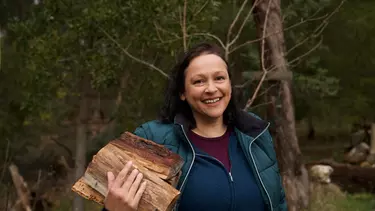
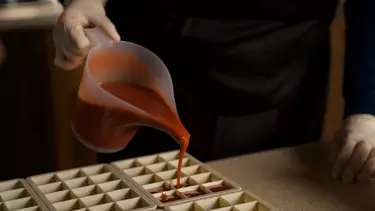
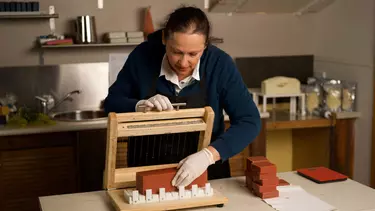
How has working in the spa industry influenced your work?
I started working in the spa industry in 2002 at a place in Daylesford, a well-known spa capital in Victoria. At the time, I was becoming interested in things like pelotherapy and wanted to create my own products. I had this idea for clay-based soaps and body lotions, but at the time it was challenging to find information about it on the internet. It was also hard because I didn’t have the money to start my own company yet and it took me about 17 years to commit to it once I felt like I had enough information.
What is your favourite product in your Opera House collection?
My general favourite is probably the yellow soap because it’s so easy to make, but I know that a customer favourite is usually the ivory clay and wattleseed soap. I also really like the activated charcoal one. I love its powerful scent and it’s not as subtle as some of the other ones. It also has lemon-scented eucalyptus oil, which I think is quite underrated compared to lemon myrtle.
What does showcasing your work through Uncovered mean to you?
It’s been an impactful business opportunity for me. It’s given me more of an understanding of what I could be trying with my business to sell on a larger scale. Equally, the opportunity to be in front of so many people and have an increased volume of orders has been good too. It’s elevated my production and also my thinking about where Mwerre could go in the future. When I started getting a higher volume of orders, it changed my thinking about what I could do with the business and gave me more confidence. It’s been a wonderful opportunity that hasn’t just been transactional.
Shop the Mwerre Soap & Skin collection
Find out more about Uncovered.

